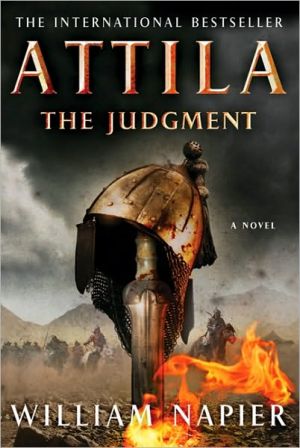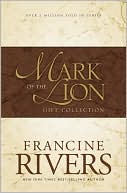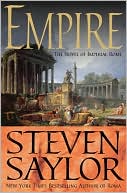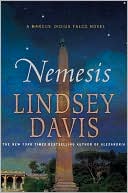Attila: The Judgment
AD 449: the future of the world hangs in the balance. The once mighty Roman Empire lies open and vulnerable to attack from a huge Hunnish army that has gathered on the banks of the Danube and is poised and ready to strike - but only one man has seen the danger. Master-General Aetius knows Attila still thirsts for blood and destruction, but he is helpless to stop the the pending onslaught. For Atilla plans to march on the mighty city of Rome, the very heart of the empire. but is the risk too...
Search in google:
The epic conclusion to the life of a great warriorPublishers WeeklyNapier wraps up his Attila trilogy on an exciting and gory note, picking up where Attila: The Gathering of the Storm left off, with Attila's invasion of the Roman empire in 449 C.E. as he begins a ruthless campaign of slaughter in revenge for Roman atrocities. As Attila and his warriors burn and kill across central Europe, the two Roman emperors, Valentinian in Rome and Theodosius in Constantinople, dither, bicker, and plot against each other, both relying on a disgraced but able Roman general, Aëtius, to save the empire. Much of the story is taken up with gruesome descriptions of all manner of violence, pushed along by secret alliances, assassination plots, trickery, spy networks, and promises of mercy made and broken. Napier (pseudonym of Christopher Hart) is a talented storyteller who pulls serpentine plots and big action sequences from historical fact, creating a muscular portrayal of fifth-century warfare between the Hun hordes and the crumbling Roman empire. (Nov.)
\ PART I THE FURY This page intentionally left blank\ 1\ MARGUS FAIR The southern banks of the Danube, AD 449\ A morning in early summer. The great river meandering slowly through the rich Moesian plains and eastward to the Euxine Sea. A patchwork of plowland and meadow, and further away from the town, blossoming orchards and copses of ancient woodland. The smaller River Margus flowing down northward from the hills to join the majestic Danube.\ Darting over the surface of the water, the bright green metallic flash of damselflies, and columns of tiny waterflies rising and falling in the warming summer air. Willows along the banks of the river and alders beside the damp streambeds. Black poplars releasing their fluffy white seeds in clouds, landing and revolving and floating on downstream. Minnows flashing and darting in shoals, trout in among the brown boulders, beautiful grayling. Nodding king-cups reflected in the water, and the meadows all around scattered with the yellow of marsh marigold and yellow flag. No sound but the wind rustling the reeds, or the single peep of a duckling as it raced over the water back to its mother, beating its stubby little wings to no effect.\ Riverine nature so peaceful and serene on this morning in early May, that for a brief moment you might think yourself back in Adam’s Eden, long before the Fall.\ And then the shadow of a heron over the waters, cruising in silent and low, its cold and passionless yellow eyes swiveling downward in search of prey.\ Come closer to the little town of Margus with its ancient walls and its cathedral tower with its solitary iron bell, and you hear the sound of human bustle and chatter. There are naked children laughing and splashing in the shallows, brown and shiny as pebbles, mischievously opening the sallow- wood fish traps and letting the fish swim free. There is laughter on the roads, and then in the meadows stretching up to the walls of the town itself, laid out in many colors and resounding with the languages of many different peoples— the great and celebrated Margus fair.\ A vast, rowdy, polyglot encampment, teeming with energy, enterprise, and greed. Open- sided canvas tents and pied awnings and stalls of carved and painted wood. People buying and selling with clacking tongues and a whole grammar of gestures and winks and hand signals. Buyers slowly producing worn leather purses from inside their robes, and sellers biting coins to test their worth— plenty of bronze coins around that have been washed with arsenic to make them pass for silver. Fur merchants from the far north, from beyond the Roman Empire, selling bearskin and marten, beaver and sable. Bright- eyed songbirds whistling in their osier cages. Everywhere the savor of smoking fish and roasting meat, and girls selling slugs of wine straight from the barrel in wooden cups. More elaborate inns and taverns under canvas. Pickpockets, of course, preying on the drunk and unwary, and women looking for husbands or at least money, walking light stepped and lazy eyed, swaying their hips between the groups of men.\ Further off, the warm ripe smell of livestock in wooden corrals. Cattle dealers and sheep sellers communicating in their secret language and occult numbers, with barely discernible nods and winks for deals. And the air everywhere filled with greetings and curses, jests and lewd remarks, the high piping cries of excited children, the cackle of geese, and a single screaming monkey in a cage. From the land of the Nubians, so the monkey seller said, without any great conviction. The monkey reached out its paw and pulled the hair of un-wary bystanders. And all this ripe human chaos under the supposed regulation of a handful of frontier troops from the towering legionary fortress of Viminacium, ten miles east.There was a girl there, a gentle, dreamy girl with a harelip, because a hare had walked across her mother’s path when she was pregnant with her. So they said. She carried a yoke of wooden pails and sold goat’s milk by the cupful, but she was not in truth a bold or assertive seller and she made little money. She too frequently gave cupfuls of milk away to hungry- eyed, plaintive children pestering her. When she returned at the day’s end, her mother would scold her for not having sold enough, accusing her of daydreaming her days away. And scold her even more for not having found a husband to take her off her poor old mother’s hands.\ She disliked jostling crowds, and was drawn to the edge of the fair where the gaudy tents and stalls gave way to open meadows, and then the low line of the hills to the west, and the jut of Mons Aureus, the mountain of gold, with its fabulous mines. The vaults of Viminacium were full of gold, so they said. When it was transported down the great imperial trunk road to the emperor in Constantinople, it went with an escort of a thousand men. And the emperor . . . the girl always imagined him as made of gold himself, seated on his high throne covered in gold leaf, like a statue, immobile, unapproachable. A living god.\ Now she lingered shyly before an old woman’s canopy of grubby canvas supported on gnarled staves.\ “Come you in, girl, come you in. It’s a lover you’ll be wanting at your age!”\ The old woman grinned and bobbed about among her strange wares, performing almost a little dance, her white hair in a tight bun, her ringed fingers fluttering. The old woman was no witch, no purveyor of instruments for cruelty, malice, and revenge, but only a fortune- teller. A preacher had earlier that morning come out of the town to stand by her tent and preach on the text “Thou shalt not suffer a witch to live,” but the people only scowled at him and passed on, leaving the preacher impotent and the old woman alone and unlynched.\ The girl hesitantly set down her pails and the old woman took her hand and drew her in. Within the shadows of the tent there were animals’ feet and tails, and strangely shaped stones like seashells, long dyed feathers of heron and bustard, tufts of multicolored rags tied round sticks topped with small brass bells, leather pouches of herbs, bottles of dubious liquor. Then something else caught the girl’s eye, something very beautiful, which she took at first for a mirror. A little vanity such as rich ladies use to admire themselves when they are carried to dinner in their gilded litters, through the grand wide streets of great cities. Jeweled ladies with their white- chalked faces and forearms and little flattering mirrors.\ The old fortune- teller knew at once what she wanted and bobbed over and retrieved it. It was a strange box made from hinged colored glass, held together with silver wires. It would be very costly and the girl had no money but for the few desultory coppers she had earned so far that morning. But the old woman brought the colored glass box out into the sunshine anyway and passed it to her without mockery.\ “Look into it,” she said. “Hold it up to the light. Some see the world as it is, though in many pretty colors. But some, who have the gift, see the world as it will be.”\ The girl hesitated. She didn’t know that she believed in such things. Not really. Besides, who has the strength to see their own future? Especially a poor goat girl with a scold of a mother and a harelip?\ The woman nodded encouragingly. “Look, child. The future may yet be sweet, and you have the gift.”\ Somewhere in the distance there was a boy crying out from the river, drawing up his boat. Yelling, screaming about something. Running toward the fair. It was all the excitement no doubt, nothing more.\ So the girl held the little box of colored glass up before her face and opened one of the delicate little hinges. It was the deep red glass that she held up to her eyes, and she looked through and shuddered. Because she saw the world as if covered in blood. The mountain of gold to the west was a mountain of blood. The screaming of the boy running up from the river grew louder, closer. She saw the straggling meadows leading away along the river bank, groups of people carry ing their baskets, pushing their handbarrows, coming through the long grass toward the fair on this gentle summer day. And beyond that, the low line of hills still catching the morning sun, but all red, all clouded red. The future.\ She felt the old woman tugging at her sleeve, heard her saying something, and was about to tear her eyes away from this ghastly vision, this world of a blood- red future, when a movement in the far distance caught her eye, and instead of lowering the evil box she continued to stare through its red haze.\ Rising up over the crest of the low hills to the west, she saw a line of horse men. Banners in the breeze and spears against the sky.
\ Publishers WeeklyNapier wraps up his Attila trilogy on an exciting and gory note, picking up where Attila: The Gathering of the Storm left off, with Attila's invasion of the Roman empire in 449 C.E. as he begins a ruthless campaign of slaughter in revenge for Roman atrocities. As Attila and his warriors burn and kill across central Europe, the two Roman emperors, Valentinian in Rome and Theodosius in Constantinople, dither, bicker, and plot against each other, both relying on a disgraced but able Roman general, Aëtius, to save the empire. Much of the story is taken up with gruesome descriptions of all manner of violence, pushed along by secret alliances, assassination plots, trickery, spy networks, and promises of mercy made and broken. Napier (pseudonym of Christopher Hart) is a talented storyteller who pulls serpentine plots and big action sequences from historical fact, creating a muscular portrayal of fifth-century warfare between the Hun hordes and the crumbling Roman empire. (Nov.)\ \ \ \ \ From the Publisher“Alliances, betrayal, assassination, gory battles, torture and cruelty mark this blood-soaked historical, and Napier describes it all vividly and with sword-pounding impact.”\ -- Publishers Weekly\ "Rip-roaring...a tale jam-packed with epic set pieces, bloody blattles, a fair bit of history, and the requisite lusty interludes...[a] gripping novel." --Daily Mail (UK) "William Napier has a genius for making the blood-dimmed chaos of ancient history into the very stuff of thrilling narrative." --Tom Holland, author of Rubicon and Persian Fire\ \ \








